Winter Tabbouleh with Roasted Delicata Squash
This post may contain affiliate links. Please read my disclosure policy.
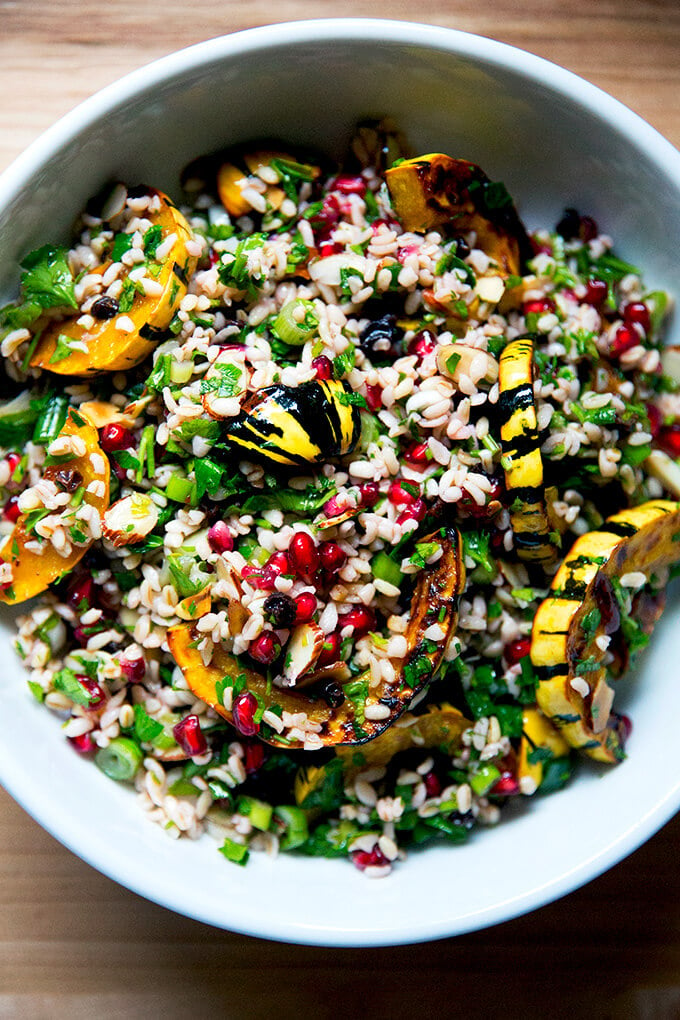
Last week, while chatting about our Thanksgiving menus, a friend reminded me of a moment in Salt Fat Acid Heat in which Samin Nosrat laments the absence of acid, with the exception of cranberry sauce, on the Thanksgiving table.
In the scene, Samin recounts one Thanksgiving, during which she found herself spooning cranberry sauce over EVERYTHING to get that much needed bite she was so accustomed to and which she found herself craving.
(Incidentally, whether it’s for the acid or the sugar, my sister’s behavior at the Thanksgiving table is no different …)
But in any case, Samin’s observation made me realize I had never given too much thought about balance in regard to the Thanksgiving menu. Thanksgiving, in my experience, has never, in fact, been about balance, but rather a mix of tradition plus excess.
And if I were to really scrutinize my family’s menu, acid is definitely under-represented. Cranberry sauce certainly provides some sharpness, and when my in-laws host, their braised red cabbage, made with a generous amount of vinegar and red currant jelly, provides that much needed acidic counterpoint.
I hung up the phone with my friend and thought: Maybe it’s time to change up the Thanksgiving menu?
I think this winter tabbouleh, loaded with herbs, punctuated by pomegranate arils, currants, and toasted almonds, and dressed in a bright, very sharp dressing is a good place to start.
If you already have too many starchy items on your Thanksgiving menu, you can definitely leave out the roasted delicata squash, though its inclusion makes for an especially festive and pretty dish.
3 Tips for Excellent Tabbouleh
- It is worth seeking out extra-coarse bulgur to make this tabbouleh. Greek and other international markets typically sell it, as does Amazon. The texture is so nice — light but chewy — and it holds up well in the fridge.
- Use a 2:1 ratio of acid-to-fat. Here it’s 1/4 cup fresh lemon juice + 1/4 cup white balsamic vinegar to 1/4 cup olive oil. I like using a mix of vinegar and fresh juice, but use what you have. As always, adjust to taste.
- Dress the salad without the squash and let it sit for at least 10 minutes before tasting, then taste and adjust the flavors to your liking. Once you get the seasoning right, add the squash at the very end and toss gently.
Here’s the play-by-play: You need a cup of bulgur.
Soak in a large bowl of cold water for about an hour.
Gather the remaining ingredients. Start by soaking a quarter cup of currants in white balsamic vinegar and slowly toasting the almonds over low heat while you prep everything else.
Roast the squash: dress it with olive oil and salt, then …
… transfer to a rimmed sheet pan and place in the oven.
In the meantime, chop up some parsley and scallions.
Cut a pomegranate in half, then whack the back of it with a spoon to release the arils.
Season the bulgur with salt, lemon, and olive oil; and toss to combine. You truly can stop here …
… but the roasted delicata squash is a nice touch.
Toss!
Serve! Revel in your new favorite acidic Thanksgiving side dish.
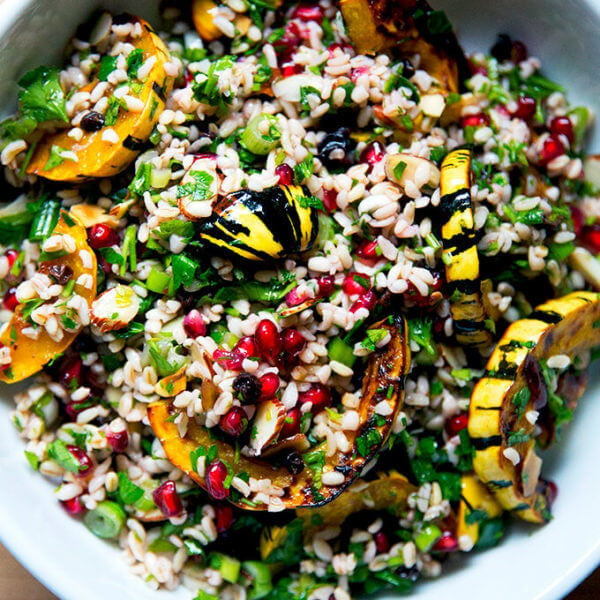
Winter Tabbouleh with Roasted Squash
- Total Time: 1 hour 25 minutes
- Yield: Serves 8 as a side dish
Description
Bulgur: If you have never tried extra-coarse bulgur, I encourage you to make the effort to get your hands on some — the texture is so nice. You can find it at Greek and other international markets. I almost always order it (Duru Extra-Coarse Bulgur) because I have a hard time finding it.
Use the recipe as a guide: The nuts, the herbs, the squash, even the bulgur can be swapped out for what you like — farro, barley, Israeli couscous, would all be nice here. If you’re looking for a gluten-free option, quinoa might work as well.
Make it ahead. This dish can absolutely be prepared a day in advance — it tastes delicious on subsequent days. If, however, you want to make it ahead for the purpose of serving for company, I suggest holding the parsley and the pomegranates till the day you serve it — both lose a bit of vibrancy on day 2. I also would hold on folding in the squash. You can roast the squash ahead of time, but let it cool, then store in the fridge. Fold it in just before serving. I love this salad cold from the fridge, but if I were to make it ahead with the intention of serving to company, I would bring it to room temperature before serving.
Ingredients
- 1 cup bulgur, extra-coarse if possible
- ¼ cup currants
- ¼ cup white balsamic vinegar
- 1 large delicata squash, halved, seeds removed, and sliced into 1/2-inch thick pieces
- 2 teaspoons kosher salt, plus more to taste
- 3 to 6 scallions, thinly sliced, white and light green parts
- 1 bunch parsley, finely minced to yield a heaping cup
- ¼ cup fresh lemon juice
- 1/4 cup extra-virgin olive oil, plus 2 tablespoons for the squash
- 1 pomegranate, seeded
- ½ cup almonds, toasted
Instructions
- Heat oven to 400ºF. Place bulgur in a large bowl. Cover with cold water. Let stand for one to two hours.
- Place the currants in a small bowl and cover with the vinegar. Set aside for at least 15 minutes.
- Place the squash pieces in a large bowl and toss with 2 tablespoons olive oil and 1 teaspoon kosher salt. Spread out the squash on a large baking sheet (parchment-lined for easy cleaning), reserving the bowl, and roast for 15 to 20 minutes. Check. When the underside of the squash is golden, transfer to the broiler. Broil 2 to 3 minutes or until golden — check often! Set aside to cool to room temperature.
- Drain bulgur through a fine-meshed sieve, then transfer to reserved bowl. Add the scallions and parsley. Add the 1/4 cup lemon juice, 1/4 cup olive oil, pomegranate seeds, almonds, currants with vinegar, and remaining teaspoon of salt, and toss.
- Let sit for 10 minutes before adjusting the flavor. Taste and adjust seasoning as necessary with more salt, olive oil, lemon, or vinegar as needed. Add the squash, and toss gently. Serve.
- Prep Time: 1 hour
- Cook Time: 25 minutes
- Category: Side Dish
- Method: No-Cook
- Cuisine: Greek
This post may contain affiliate links. Please read my disclosure policy.

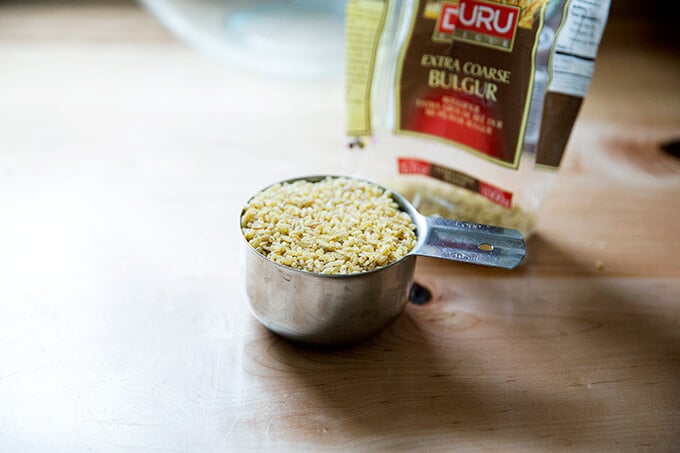
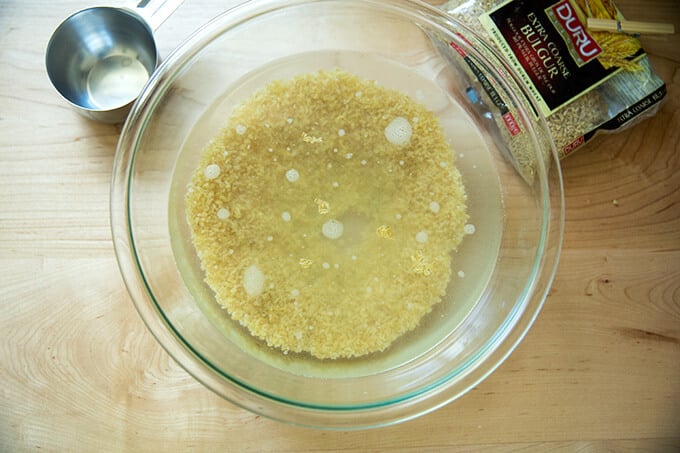
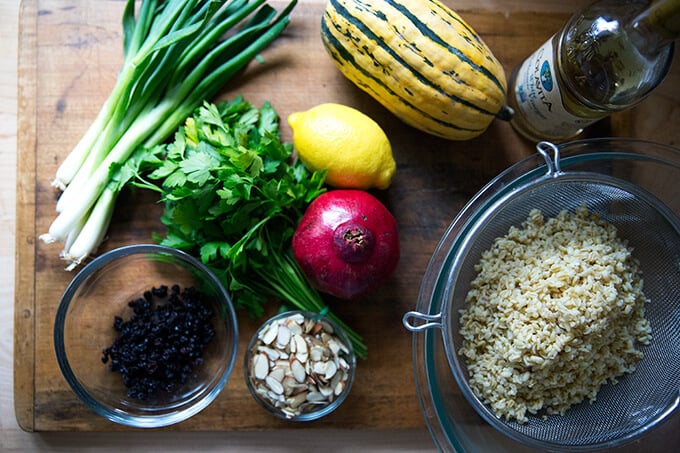
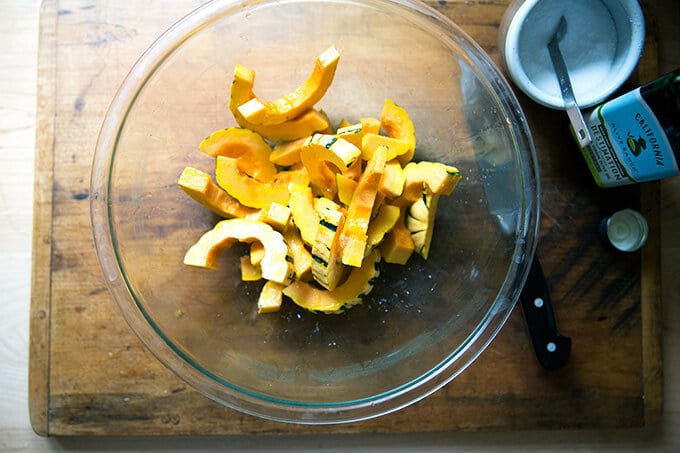
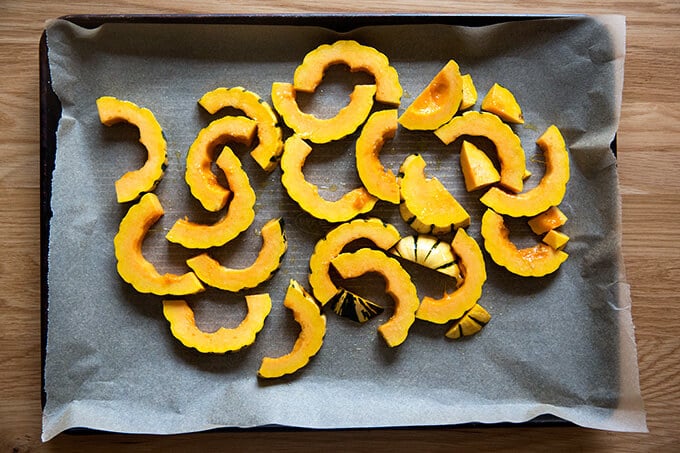
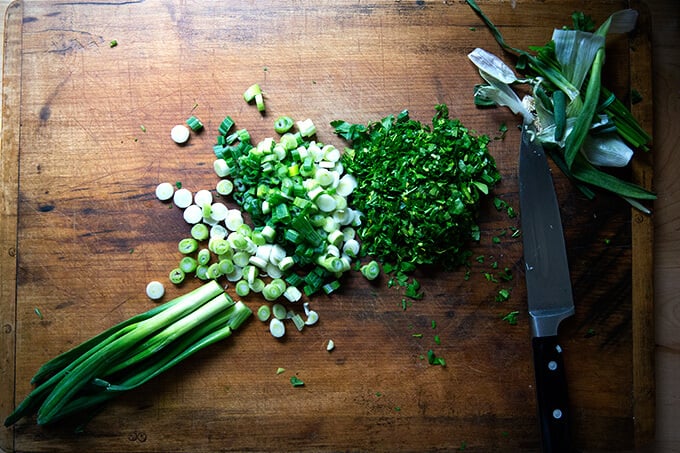
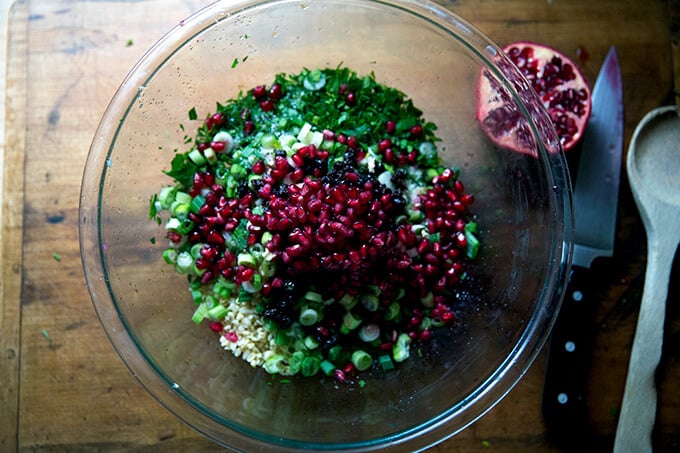
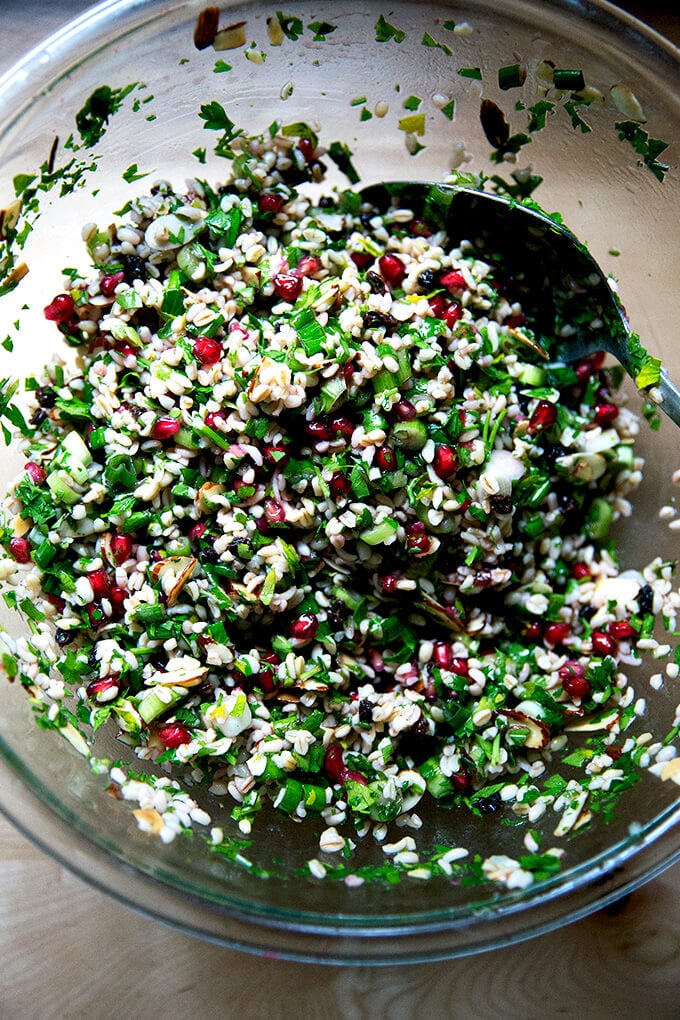
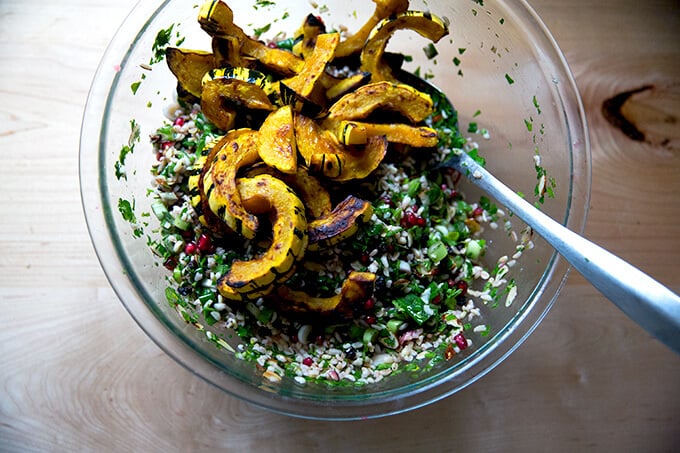
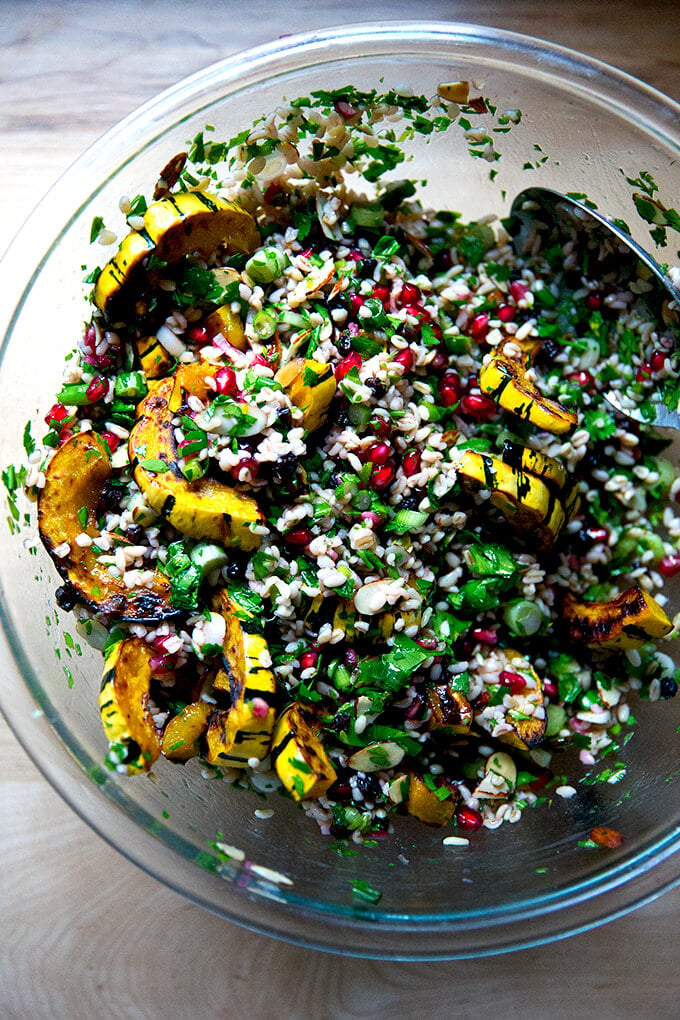
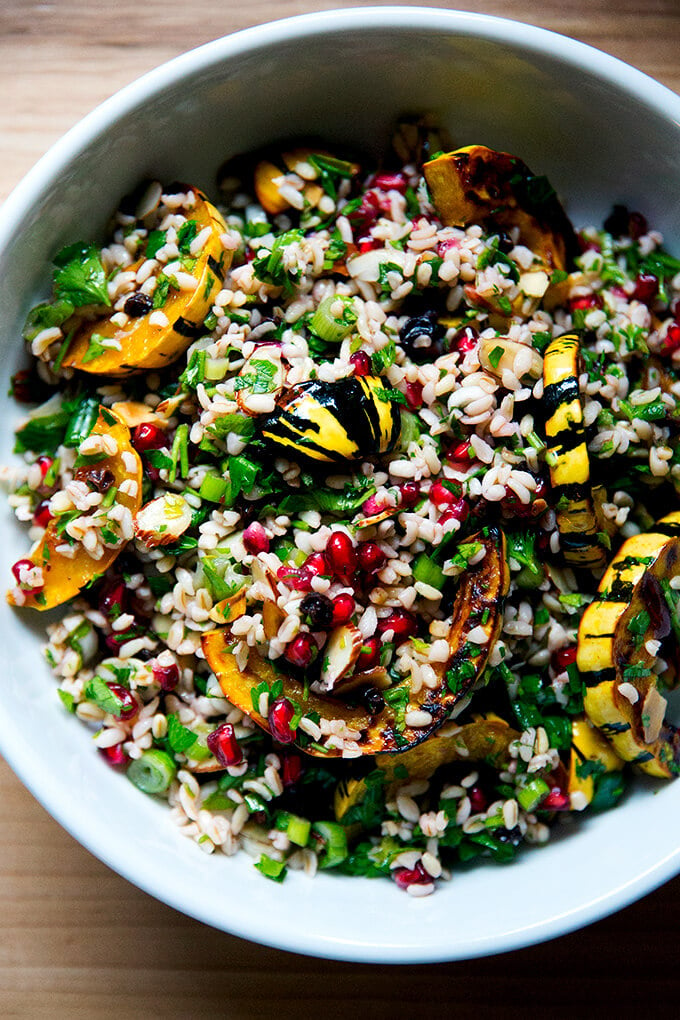


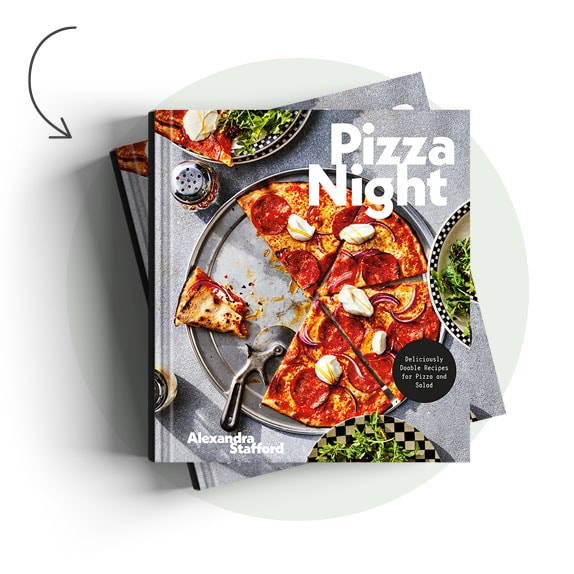
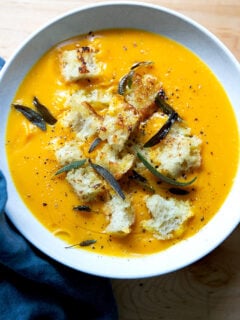

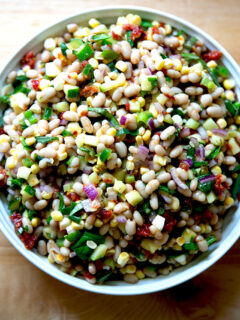
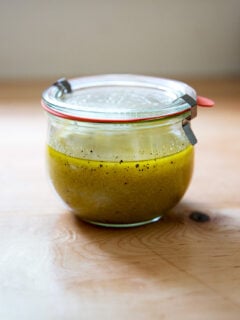

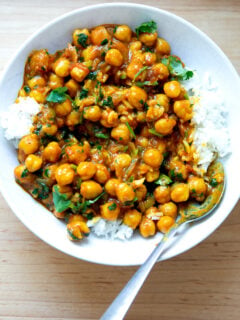

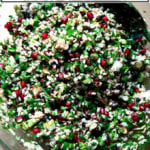
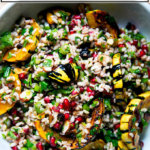
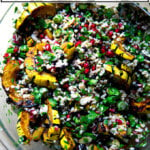
31 Comments on “Winter Tabbouleh with Roasted Delicata Squash”
Thanks to you, I am now hooked on delicata squash. Here in Arizona, I can only find it at Trader Joe’s in the fall so now I save the seeds and grow it. I totally agree with you on Thanksgiving tradition foods and adding some acid; so now every year, instead good ol’ greens beans with almonds, I’ve included one of your mouth watering sides. My gosh, you are fantastic!!! Thank you for getting me out of my food rut. And I ordered the bulgar today so this will make an appearance this Thanksgiving. Happy Thanksgiving 🍁😊
Wow, amazing! Love that you grow delicata squash … I barely buy any other squash these days, because I know delicata squash is just that much easier. Yay for ordering the bulgur! It’s so good. Happy Thanksgiving to you! Thank you for the kind words 🙂
This looks wonderful. I always serve sauerkraut with Thanksgiving dinner. I love it with turkey, and it does add that acidic punch. I only make a small amount and use it more like a condiment.
Love the recipes I’ve tried so far. Do you have a vegetarian moussaka in your arsenal? I saw a restaurant review of one made with potatoes, artichoke hearts and fennel that sounds like a great combination.
Thanks for the wonderful recipes.
I love this idea, Winnie! I think that’s why I love my in-laws red cabbage recipe so much … it just gives the meal that much needed punch!
I do not have a vegetarian moussaka recipe in my arsenal — my family’s recipe has lamb — but I love the sound of the one you mentioned, and I love the idea of exploring a vegetarian version.
Thank you for the kind words 🙂
Alexandria, do you have that red cabbage recipe!??
I do! Here you go:
Grandma Violet’s Red Sweet and Sour Danish Cabbage
2 heads of red cabbage, shredded or chopped
1/2 jar (or more) red currant jelly
1/2 cup sugar
1/2 cup vinegar (or more)
1/2 to 3/4 cups butter
Place chopped up cabbage in large Dutch oven and cook with butter, jelly, sugar and vinegar until soft. The longer you simmer it, the better it will taste. Add more sugar, jelly or vinegar to taste. Add salt to taste.
My notes: This really is a “to-taste” recipe. When we make it, we simmer it for hours and everyone weighs in on what it needs — more salt, more vinegar, etc. — but it all comes together in the end 🙂
I made the salad and love it. I had cooked farro in the fridge and made it with that (it holds up really well)- this recipe is a keeper! Thanks again for another great recipe.
So happy to hear this, Winnie! 🙂 Love the texture of farro.
Ali, this looks great—very tempting—but im wondering if part at least can be done a day ahead. Such a busy day and I’m slowing down these years. I always enjoy your posts, thanks. Think I’ll go have a piece of Allies whole wheat toast!
Thank you, Gay 🙂 🙂 🙂 You can definitely make this ahead of time … it’s so good on the next day. I stand at the fridge eating this from the quart storage container. I would hold the parsley till the day you serve it, only so that it looks especially fresh and bright. And if you have the time to hold the pomegranate, I would do that, too, bc they, too, lose a bit of their vibrant color on subsequent days. Happy Thanksgiving!
I like the idea of this, and wonder if I could make it without the delicata. We already have too many starchy dishes and although delicata is less starchy than her cousins, it is still too much food for 5 people (well 4 people since my husband would never eat it).
Definitely make it without the delicata! It’s so, so good without it. There’s enough starch on the Thanksgiving table! 🙂
Delicious as always! Will be bringing this to thanksgiving this year. Thanks!
oh yay! Makes me happy 🙂 🙂 🙂
This recipe looks perfect for my vegetarian Thanksgiving, just to clarify, the bulgur is simply soaked and not cooked? Thank you for sharing!
Yes! Now, with other brands, just check the bag … if they instruct to cook the bulgur, maybe follow the instructions 🙂
This is an amazing till now and a perfect recipe for the vegetarian & i will definitely make it few days later…thanks a lot for beautiful recipe….!
Looking forward to making this recipe for Thanksgiving, bur have not used delicata squash before. The recipe says 1 large squash, but how much is that exactly? The ones in the store seem very small.
Thanks!
Hi Viveca! I just weighed a medium-ish delicata squash, and it weighs about 15 ounces. I think you can get away with using one about that size or two smaller ones or one larger one. In short, about 1 to 1.25 lbs.
Such a nice dish, love it
Will try this one out!
Thanks for sharing…!
I love this recipe! I made it last year many times and have just found my first pomegranates this year and will be making this again ASAP. The flavors are wonderful and bright.
So nice to hear this, Andrea! My son was just asking me when pomegranate season was, and I realized: it’s now! Alas, no pomegranates at the store for us yet, but they’ll be here soon. Hope you are well! xo
Made this last year, so good! Like that it is vegan too for my sons. It’s on the menu again!
So nice to hear this Viveca! And great to hear your vegan sons approve. Thanks so much for writing 🙂 🙂 🙂
OK, I’ve been reading and using on-line recipes for years but this is the first time I’ve felt compelled to comment. This recipe is OUTSTANDING! I made it for our pared-down Thanksgiving and it clearly was the highlight of the meal. I used my garden harvest — butternut squash, scallions, flat-leaf parsley — along with extra course bulgar I’d ordered on-line. And in addition to being fabulous on Thanksgiving, it kept well, but did not last long. Can’t wait to make it again.
So wonderful to hear this, Wendy! Thanks so much for taking the time to write. I love that extra-coarse bulgur. Totally worth seeking it out. Hope you had a wonderful Thanksgiving!
I purchased the Duru bulgar that you recommended. The instructions on the package say to cook in hot water. I’ve never heard of your method of soaking grains in cold water, so I’m a bit hesitant to try it. Any words of encouragement? Thanks!
The cold soak works! You may need to soak it for more than 1 hour, but I promise you it works — I’ve never boiled it or cooked it in hot water.
Hi Ali! I have a weird allergy to pomegranates and wonder what I could replace the seeds with and maintain the brightness. Orange segments? Dried cranberries? I’d love to make this if you think a substitution will not alter it too much. It looks delicious! Thanks for your help!
Hi Kelly! I think either orange or dried cranberries sound great here. You could also halve or quarter some purple or green grapes.
I followed your recommendation and made the occasions a day in ahead of time. The flavor of bulgur always seems neutral to me. But combining it with the dressing and letting it soak greatly improves this!
Keep going! I am implementing the majority of your suggestions. Even I will try your cakes one day…
Best wishes from the Neeraj